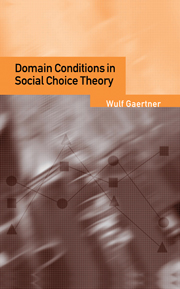Book contents
- Frontmatter
- Contents
- Preface and acknowledgements
- 1 Introduction
- 2 Notation, definitions and two fundamental theorems
- 3 The existence of collective choice rules under exclusion conditions for finite sets of discrete alternatives
- 4 Arrovian social welfare functions, nonmanipulable voting procedures and stable group decision functions
- 5 Restrictions on the distribution of individuals' preferences
- 6 The existence of social choice rules in n-dimensional continuous space
- 7 Concluding remarks
- References
- Author index
- Subject index
1 - Introduction
Published online by Cambridge University Press: 02 December 2009
- Frontmatter
- Contents
- Preface and acknowledgements
- 1 Introduction
- 2 Notation, definitions and two fundamental theorems
- 3 The existence of collective choice rules under exclusion conditions for finite sets of discrete alternatives
- 4 Arrovian social welfare functions, nonmanipulable voting procedures and stable group decision functions
- 5 Restrictions on the distribution of individuals' preferences
- 6 The existence of social choice rules in n-dimensional continuous space
- 7 Concluding remarks
- References
- Author index
- Subject index
Summary
The theory of social choice is abundant with impossibility theorems. The simplest impossibility result is probably the ‘paradox of voting’ which has been known for a long time. Imagine that there is a society comprising just three individuals who have to decide on whether to adopt policy x or policy y or policy z in order to increase economic welfare in their small community. Anticipating that their individual preferences will by no means be unanimous, the three members of society have agreed to use the simple majority decision rule as their method of aggregation. Let individual 1 prefer x to y, y to z and x to z, individual 2 prefer y to z, z to x and y to x, and individual 3 prefer z to x, x to y and z to y. Having applied the simple majority rule, the three persons obtain the following result: x is socially preferred to y, y to z and z to x. Obviously, each policy is dominated by one of the other two policies by a majority of two to one. What should be done in this situation? This is a difficult question indeed. The proposal to determine a sequence of pairwise decisions is no way out of the impasse, for the three individuals can be expected to disagree sharply on which pair of alternatives should be the first in the sequence of pairwise choices.
- Type
- Chapter
- Information
- Domain Conditions in Social Choice Theory , pp. 1 - 10Publisher: Cambridge University PressPrint publication year: 2001



